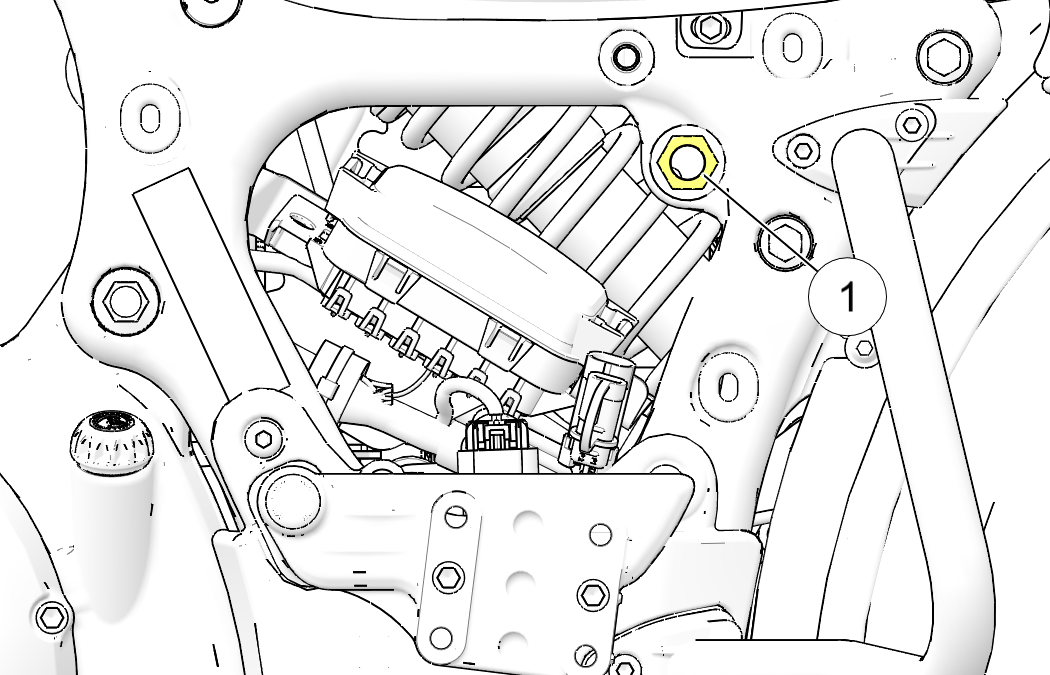| caution |
| Air pressure increases VERY quickly when using pressurized air. Wear
eye and face protection. |
For riding comfort
and to ensure proper ground clearance, adjust rear shock air pressure.
Refer to the label located on the
inside of the left side cover. The label shows recommended
pressures based on potential load weights. Always inspect and adjust
shock preload (ride height) based on your actual
load weight, in addition to adjusting shock air pressure.
Follow these guidelines
when adjusting:
- Park the motorcycle
with the sidestand down on a firm, level surface. Remove all riders
and cargo.
- DO NOT exceed 150
PSI (1034 kPa) in the shock.
- Use the INDIAN MOTORCYCLE
Air Pump and Gauge (P/N PV-48909). Follow the instructions on the
following pages.
If the recommended
air pump is not available, use a gauge and a pressurized air source
with a maximum line and gauge pressure
of 150 PSI (1034 kPa). After using the alternate
gauge, remove it quickly to minimize leakage. Expect to lose up to
5 PSI
(34 kPa) with each pressure check. Use only a dry air source, such
as a system with a water separator or air line dryer, to prevent moisture
from entering the shock.
| AIR SUSPENSION ADJUSTMENT |
| TOTAL CARGO & OCCUPANT WEIGHT (lbs) |
AIR PRESSURE (psi) |
MAX PRESSURE: 150 PSI |
| NO TRUNK |
LEATHER TRUNK |
PAINTED TRUNK |
| 0 |
0 |
0 |
0 |
SELECT PRESSURE CORRESPONDING
TO TOTAL CARGO AND OCCUPANT WEIGHT. REMOVE ALL PASSENGERS AND CARGO
BEFORE SETTING/CHECKING
SHOCK PRESSURE. SET PRESSURE WITH BIKE
ON SIDE STAND.
|
| 150 |
0 |
0 |
0 |
| 175 |
0 |
0 |
10 |
| 200 |
0 |
10 |
23 |
| 225 |
10 |
23 |
30 |
| 250 |
23 |
30 |
38 |
| 275 |
30 |
38 |
48 |
| 300 |
38 |
48 |
60 |
| 325 |
48 |
60 |
71 |
| 350 |
60 |
71 |
85 |
| 375 |
71 |
85 |
100 |
| 400 |
85 |
100 |
122 |
| 425 |
100 |
122 |
134 |
| 450 |
122 |
134 |
145 |
| 475 |
134 |
145 |
N/A |
| 500 |
145 |
N/A |
N/A |
Low Shock Models
| AIR SUSPENSION ADJUSTMENT |
| TOTAL CARGO & OCCUPANT WEIGHT (lbs) |
AIR PRESSURE (psi) |
MAX PRESSURE: 150 PSI |
| NO TRUNK |
PAINTED TRUNK |
| 0 |
0 |
0 |
SELECT PRESSURE CORRESPONDING
TO TOTAL CARGO AND OCCUPANT WEIGHT. REMOVE ALL PASSENGERS AND CARGO
BEFORE SETTING/CHECKING
SHOCK PRESSURE. SET PRESSURE WITH BIKE
ON SIDE STAND.
|
| 150 |
0 |
0 |
| 175 |
0 |
10 |
| 200 |
0 |
17 |
| 225 |
10 |
24 |
| 250 |
17 |
45 |
| 275 |
24 |
65 |
| 300 |
32 |
85 |
| 325 |
40 |
97 |
| 350 |
52 |
110 |
| 375 |
67 |
119 |
| 400 |
82 |
127 |
| 425 |
98 |
136 |
| 450 |
114 |
145 |
| 475 |
130 |
N/A |
| 500 |
145 |
N/A |
Shock Air Pressure Adjustment
Procedure
- Park the motorcycle
with the sidestand down on a firm, level surface. Remove all riders
and cargo.
- Remove the left side
cover. Remove the cap from the air fitting
 .
.
- Determine the recommended
rear shock air pressure. Refer to the label located on the inside
of the left side cover.
- Install the hose
fitting of the recommended gauge securely onto the air fitting. Read
the air pressure on the gauge.
- To reduce air pressure, push the
bleed button on the gauge. Bleed pressure in small amounts until the
desired pressure is attained.
- To increase pressure, pump the handle
until pressure increases to the desired amount.
| caution |
| DO NOT exceed 150 PSI (1034 kPa) in the shock. |
- Remove the hose from
the air fitting and reinstall the cap.
| TIP |
| Expect to lose up to 5 PSI (34 kPa) with each pressure check. |
- Repeat the preload
inspection to verify proper preload. See Rear
Shock Preload (Ride Height) Inspection.

